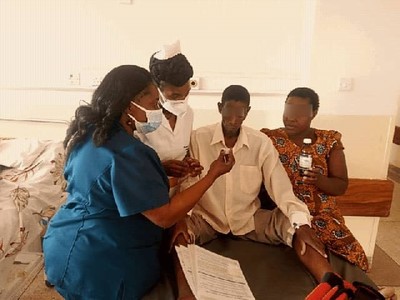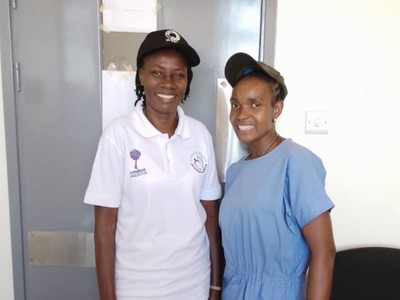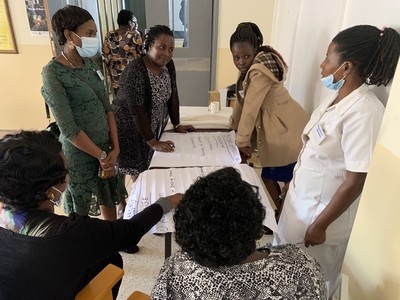
Blog: Meet Cathy Namuto Magoola: Cairdeas Scholar
![]() Hannah Ikong
Hannah Ikong
![]() 22nd March 2024
22nd March 2024
Meet Cathy Namuto Magoola, the newest Cairdeas Scholar! Last month, Cathy began a one-year Advanced Diploma in Palliative Care programme with the Mulago School of Nursing and Midwifery in Kampala, Uganda. We are pleased to partner in Cathy’s nursing education and appreciate her role with PcERC at their unit in Kiruddu National Referral Hospital (KNRH).
We first met Cathy nearly two years ago, in April 2022, as a nurse who was assigned by KNRH to work with the palliative care unit (PcERC, that is, Palliative care Education and Research Consortium). As a government nurse, Cathy did not have much prior experience in palliative care but was interested in the field and eager to learn. With the supervision of Sr. Nurse Florence Nalutaaya in PcERC, she soon was providing palliative care to the patients and families at the hospital.
I have interacted with Cathy on many occasions, and from the beginning, she has always had a kind heart and listening ear. When we sat down for the interview (as the newest Cairdeas Scholar), midway Cathy quipped, “I’m talking too much!” Yet it is good to hear from Cathy and understand her approach to palliative care, with almost two years of on-the-job training with PcERC and new studies in her Advanced Diploma.
“My mentors are nurse Florence and nurse Berna,” Cathy told me, “And they have not only been my mentors but my models in palliative care. I’ve learnt so much from them. Once, we had a patient who was really struggling on Level 5 in Kiruddu Hospital. His caregiver had abandoned him, and he had no one to help him get anything to eat. He was on oxygen, laying in bed, and too weak to go and do anything.
She continued, “Nurse Berna found him one morning, trying to negotiate with another patient’s caregiver to help him eat, but that other carer was not taking the time to help! Berna stopped immediately and took time to feed the patient herself. Once he was strong enough to eat on his own, Berna worked with the hospital staff and with PcERC’s Comfort Fund to ensure the patient received food in a timely manner. He has already passed away, but he was very happy with Berna and appreciative of our palliative care team. I learned then that I have to create time for our patients.”
Her time now is stretched between working on the ward and attending classes for her Advanced Diploma in Palliative Care. “We attend class from Monday to Friday, and after the 5th of April, I will be going on a clinical placement for a month” Cathy told me. “Once we come back in May, there will be more classes and end of semester exams. I have been learning such amazing and new aspects of palliative care in class, from our course material to the experiences shared by my tutor and fellow students. These all help me be prepared for what is ahead of me.”
What are the next steps for Cathy? In the immediate future, she is in an ethical issues course unit and is learning about will writing. “They are teaching us the foundation of palliative care, and we are each also preparing for a research project. I’ve identified my research topic to study on as ‘The Knowledge, Attitude, and Practices of Healthcare Workers in KNRH.’ I was very much interested in end of life care and researching that at my hospital, but they said that was done recently, so I am looking at the healthcare workers instead.”
“I have been very motivated to start this programme so I can be certified in prescribing [pain medication such as morphine]. Often I find one of our patients in pain and yet currently, in my level of nursing, I cannot prescribe anything for them. I have to go and find a doctor to write the prescription – and they are not always on the ward – while the patient waits in pain. With this Advanced Diploma in Palliative Care, I will be certified to prescribe, and be among some of the only nurse prescribers in Uganda.”
Cathy likewise hopes to continue her education in palliative care. “In the next 10 years, I would like to do my bachelor’s in nursing. One day I hope to go into management or tutorship, so I can teach fellow nurses.” When I asked her what she would like to teach, when she is a senior nurse, she quickly vouched for palliative care. “I want to stay in palliative care; the more that I work in this field, the more experience I get, the more I like it actually.”
“Many think that palliative care is for the dying,” Cathy told me. “But no, palliative care is aimed at improving the quality of life for the patient with life-limiting conditions. It needs to start from time of diagnosis; they shouldn’t wait to call in our palliative care unit when the patient is actively dying.”
She’s communicated about palliative care recently to a surgeon who wasn’t yet ready to refer a patient with stomach cancer to palliative care. (The surgeon compiled, sending the patient and the family to the unit for support as they navigate cancer treatment.) She has been advocating for palliative care in KNRH and even in the other national referral hospital of Mulago. Cathy has well deserved her scholarship support from Cairdeas IPCT, which has supplemented her partial scholarship from the Palliative Care Association of Uganda (PCAU).
We are excited to see what is ahead for Cathy Namuto Magoola and with her work in palliative care, the Ugandan government hospitals will be a better place.

Meet Cathy Namuto Magoola; a government nurse stationed with the PcERC unit in Kiruddu National Referral Hospital.

Sr Nurse Florence Nalutaaya (far left) from PcERC demonstrates the correct morphine dosage to Cathy Namuto Magoola (second from left), he patient and caregiver.

It's Hat's On 4 Children's Palliative Care time with #ICPCN - this was last October with nurses Bernadette Basemera (left) and Cathy Namuto Magoola (right).

Cathy Namuto Magoola (far left, in green) participates during a group activity during a Healthcare Worker's Palliative Care training by PcERC.
